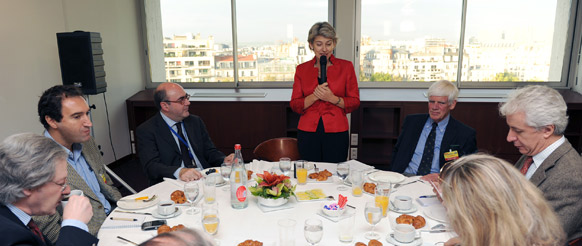
Some thirty members had a first-hand chance to probe Irina Bokova’s background, experience and plans for UNESCO following her successful election as Director General of the Paris-based agency, in a newsworthy, lively event on Oct. 7.
Our breakfast meeting with Bokova, still at that time Bulgaria’s ambassador to France, took place at UNESCO headquarters, following a heated behind-the-scenes battle in which she narrowly defeated the controversial, Egyptian culture minister, Farouk Hosny.
Relaxed, forthcoming, and on-the-record, the 57-year-old diplomat told us about her background: how she had once wanted to be a foreign correspondent; why she supported and respected the role of her father, former editor of Bulgaria’s then-leading Communist Party newspaper, and who had proven a strong, anti-Nazi resistant leader during World War II; and how, over the years, as a trained diplomat, she came to actively support Bulgaria’s membership in the European Union and NATO.
Responding to many questions, Bokova outlined her plans for UNESCO as she prepared to take over from Japan’s Koichiro Matsura, who was our guest, nine years earlier. She pledged to address such key, global issues as climate change, gender roles, the financial crisis and said she plans to decentralize the organization with its 2,800 employees. Some thirty members had a first-hand chance to probe Irina Bokova’s background, experience and plans for UNESCO following her successful election as Director General of the Paris-based agency, in a newsworthy, lively event on Oct. 7.
Our breakfast meeting with Bokova, still at that time Bulgaria’s ambassador to France, took place at UNESCO headquarters, following a heated behind-the-scenes battle in which she narrowly defeated the controversial, Egyptian culture minister, Farouk Hosny.
Relaxed, forthcoming, and on-the-record, the 57-year-old diplomat told us about her background: how she had once wanted to be a foreign correspondent; why she supported and respected the role of her father, former editor of Bulgaria’s then-leading Communist Party newspaper, and who had proven a strong, anti-Nazi resistant leader during World War II; and how, over the years, as a trained diplomat, she came to actively support Bulgaria’s membership in the European Union and NATO.
Responding to many questions, Bokova outlined her plans for UNESCO as she prepared to take over from Japan’s Koichiro Matsura, who was our guest, nine years earlier. She pledged to address such key, global issues as climate change, gender roles, the financial crisis and said she plans to decentralize the organization with its 2,800 employees.
—- Axel Krause